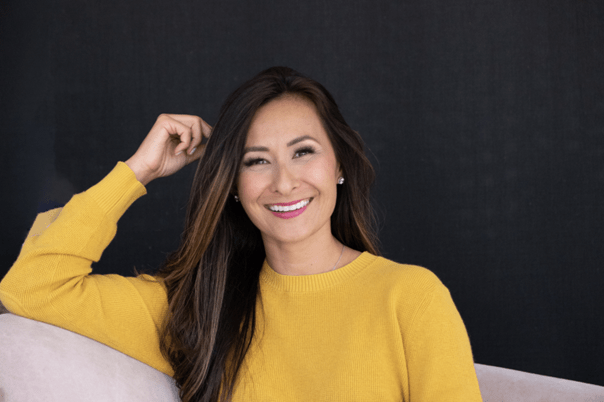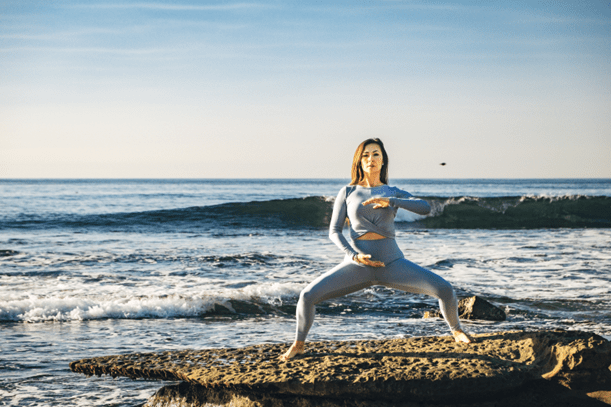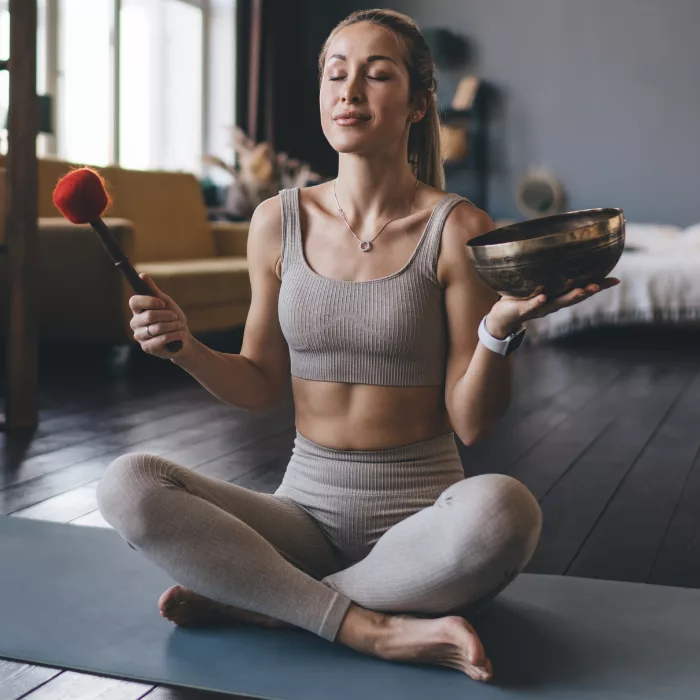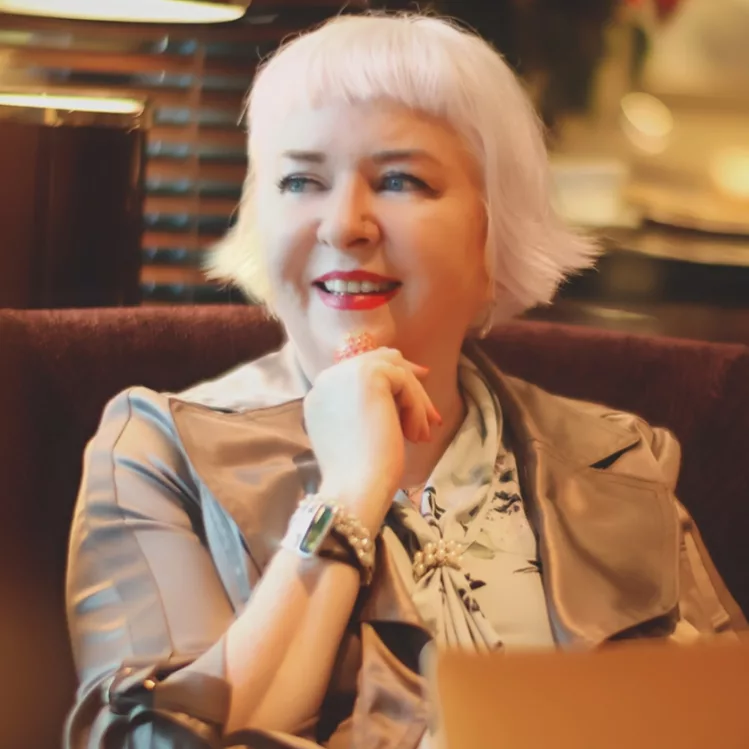
Jenelle Kim: Nurturing Mind, Body, and Spirit — My Insights as a 9th Generation Herbalist and Living Meditation Expert
Dr. Jenelle Kim, DACM, L.Ac., is a distinguished International best-selling author, 9th-generation Master Herbologist & formulator, Doctor of Acupuncture and Chinese Medicine, and practitioner of qi gong. With her extensive expertise, Dr. Kim combines the ancient wisdom of East Asia with the advancements of Western medicine to positively impact lives.
As a renowned wellness expert, Dr. Kim’s contributions have been recognized by notable publications such as Forbes, Allure, Meditation Magazine, Time, and Good Morning America. She passionately merges her lineage’s proprietary formulas, movements, and philosophies with modern practices, making her the first woman to be the custodian of centuries-old traditions.
In January 2022, Dr. Kim published her debut book, Myung Sung: The Korean Art of Living Meditation, with Watkins/Penguin Random House. This globally acclaimed book, available in more than 20 countries and 10 languages, introduces The 8 Keys of Living Meditation. By combining meditation, movement, and medicine, these ancient principles and methods enable individuals to achieve balance, clarity, and calm in their daily lives.
With over 20 years of experience in the beauty and wellness industry, Dr. Kim’s all-natural luxury products have graced renowned spas worldwide, including the Ritz Carlton, Four Seasons, and Mandarin Oriental. Her formulas are also sought after by esteemed retailers such as Nordstrom, Neiman Marcus, and Bergdorf Goodman, as well as natural marketplaces like Whole Foods Market and Sprouts.

My Insights as a 9th Generation Herbalist and Living Meditation Expert
Global Woman
Dr. Jenelle Kim, DACM, L.Ac., is a distinguished International best-selling author, 9th-generation Master Herbologist & formulator, Doctor of Acupuncture and Chinese Medicine, and practitioner of qi gong. With her extensive expertise, Dr. Kim combines the ancient wisdom of East Asia with the advancements of Western medicine to positively impact lives.
How did you come to discover the power of incorporating Myung Sung Living Meditation®, Tao philosophy, and mindfulness into daily life, and how has it transformed your own life?
I am the 9th generation herbalist, practitioner of martial arts (Myung Sung Moving Meditation), and practitioner of Myung Sung Living Meditation®, principles rooted in Taoist philosophy and mindfulness, in my lineage. I am the first woman to hold this duty in my lineage and the first to have the opportunity to share the principles of medicine, movement, and meditation—what I call The 3 Ms of Living Meditation“—with so many around the world.
I was born to do what I do. I come from a long lineage of traditional Oriental medical doctors and herbalists who have dedicated their lives to understanding the human mind, body, and spirit to help us find tools to achieve our healthiest condition and most balanced life possible.
From as far back as I can remember, I learned the understanding of the human mind and body from my father, my greatest mentor, and at the age of 20, I started building the first company that brought these secret herbal formulas, Living Meditation and Myung Sung Movement, to the world.
Incorporating living meditation, rooted in Taoist philosophy and mindfulness, into my daily life has been a transformative journey for me my entire life. Living meditation emphasises harmony, balance, and interconnectedness with nature. It resonated deeply with me, as it offers a holistic approach to life and well-being, encompassing physical, mental, and spiritual aspects.
Through the practice of mindfulness and the principles that make up The 8 Keys of Living Meditation, I learned to cultivate present-moment awareness and develop a deeper connection with my inner self. Mindfulness helps me to observe my thoughts, emotions, and sensations without judgement, allowing me to develop greater self-awareness and clarity, which enables me to be a better mother, wife, daughter, business owner, friend, and member of my community.
By integrating living meditation—Tao philosophy and mindfulness—into my daily life, I experience profound transformation. I become more attuned to the natural rhythms and cycles of life, embracing the ebb and flow of experiences with greater acceptance and adaptability.
Taoist philosophy teaches me to honour the interconnectedness of all things and embrace the concept of “wu wei,” or effortless action. I learn to let go of excessive striving and instead cultivate a state of flow and harmony in my actions and decisions.
Meditation and mindfulness in my everyday life are powerful tools for managing stress, enhancing focus, and cultivating a sense of inner peace. It helps me navigate challenges with resilience and respond to situations with greater wisdom and compassion.
Ultimately, incorporating living meditation, Taoist philosophy, and mindfulness into my daily life has brought me a deep sense of balance, inner peace, and well-being. It has transformed the way I relate to myself, others, and the world around me.
In Myung Sung Living Meditation, you emphasise the integration of meditation and mindfulness into every action of our daily lives. Can you share some practical examples of how someone can achieve this integration?
Imagine if all your struggles in life—in work, marriage, parenting, health, and more—could become less difficult. What if you could achieve a new level of awareness that allowed you to see yourself, others, and your path in life more clearly? What if you could change your habits so that every day you invest in your own longevity, happiness, and optimal health? While it may sound too good to be true and it certainly won’t happen overnight, this is what Myung Sung® teaches us.
Myung Sung is Living Meditation®. It’s a lifestyle practice and mindset that originated with East Asian philosophers and is rooted in the teachings of the Tao, or the way of the universe. It has been passed down for centuries, helping people learn how to place themselves beyond the persisting negative influences in life, such as stress and conflict, to connect with the limitless reserves of natural energy that exist around us.
As the daughter of a Korean monk, Myung Sung Living Meditation is a way of life for me. It has helped me grow my own business, raise a family, cultivate good relationships, and achieve my lifelong goal of writing a book. In my opinion, the best way to practice Myung Sung is by incorporating The 3 Ms—meditation, medicine, and movement—and the best way to apply Myung Sung is through The 8 Keys of Living Meditation.
Myung Sung Living meditation consists of three main elements (the 3 Ms): meditation, medicine, and movement, which are the pillars of Myung Sung because they connect us back to the universe and our true selves. With Myung Sung, we carry the peace and clarity of meditation with us in every moment to become the best versions of ourselves and to be able to balance anything that comes our way.
Myung Sung Meditation
When most people think of meditation, they picture someone sitting still in complete silence. With Myung Sung, this is not the case. Instead of taking time away from our busy lives, we incorporate the techniques of meditation and mindfulness into every action we take. We learn to clear our minds of wandering thoughts and tap into a deeper peace.
When we live in this meditative mindset, we are more in tune with ourselves and the world around us. We’re able to see situations from the perspective of others and think through our decisions more carefully. We’re able to deepen our relationships and gain a new depth of self-knowledge and understanding. As your way of thinking changes, you’ll begin to notice an impact on your life.
It’s important to remember, though, that our minds are connected to our bodies, spirits, and the universe, so you must take care of your whole self in order to live in meditation.
Myung Sung Medicine
When ancient Eastern practitioners spoke about medicine, they did not only mean what you consume when you’re sick or injured but also how you care for your body every day to ensure it is functioning at its most optimal.
As we begin to live more mindfully, we become more aware of our own condition and can make better choices to improve our health. To become the best versions of ourselves, we need to listen to our bodies and provide them with the support and nourishment they need. Natural foods, especially herbs, mushrooms, and vegetables, are packed with nutrients, adaptogens, and antioxidants that help fuel our bodies and minds with what we need to thrive.
Myung Sung Movement
In Myung Sung, the freedom to move while you meditate is not just an accommodation for our busy lives but a key element of the practice. When we are mindful of our movements, even during simple, everyday tasks such as washing the dishes, we’re able to become more aware of how our actions affect our minds. Creating a stronger mind-body connection also helps us learn to feel the natural energy that exists within us, our qi, and the flow of the universe around us.
When we are stressed, we can feel our qi (or “vital energy”) become stagnant. We often notice this when our thinking becomes sluggish and foggy, our muscles feel tight and tense, or we just feel drained, unmotivated, and uptight.
Just like with meditation, the key is to not just view movement as an activity you partake in when you have the time but as a key part of your lifestyle. While going to the gym works for some people, you can also incorporate short bursts of movement throughout your day or meet with friends to go on a walk after work to prevent your chi from becoming imbalanced.
One of my favourite ways to incorporate movement and meditation at home is with Myung Sung Moving Meditation exercises, which are rooted in Qi Gong. I have several videos on my YouTube channel that share moving meditation practices (example video). By just repeating a few simple movements for a couple of minutes, you can start to feel the benefits of moving meditation.
Another way is to choose a chore that you currently do without really feeling connected. Instead of letting your mind wander, dig in deeper. Stay deeply present. Notice all of your senses and observe all the little details you might otherwise not pay attention to. Really connect with the task you’re doing and what it feels like to exist in that moment. Allow the movement of your body to fuel your meditation.
Staying present in this mindset can be difficult at first, but as you begin to practice Living Meditation and become more familiar with it, you will notice that you will be able to approach other situations with the same sense of calmness and connectivity with yourself and the situations around you.

As a doctor of Chinese medicine and an educator, how do you see the connection between traditional natural medicine and our overall well-being? How can we value our health and listen to our bodies to achieve optimal wellness?
I see a strong connection between traditional natural medicine and our overall well-being. Traditional natural medicine, rooted in ancient healing practices, recognises the innate healing capacity of the body and focuses on restoring balance and harmony.
Valuing our health begins with acknowledging that our bodies have innate wisdom and healing capacity. Traditional natural medicine encourages us to listen to our bodies, paying attention to the subtle signals and messages they send. By cultivating self-awareness and mindfulness, we can develop a deeper understanding of our unique needs and respond accordingly.
To achieve optimal wellness, it is important to adopt a proactive approach. Traditional natural medicine emphasises preventive care, focusing on maintaining good health rather than solely treating illness. This involves embracing lifestyle practices that support well-being, such as nutritious eating, regular exercise, stress reduction, and sufficient rest.
In traditional natural medicine, the mind-body connection is paramount. It recognises the influence of our thoughts, emotions, and stress levels on our overall health. Practices like meditation, mindfulness, and breathing exercises are integrated to promote emotional well-being and enhance the body’s healing processes.
The use of natural therapies is another cornerstone of traditional natural medicine. Herbal medicine, acupuncture, dietary therapy, and movement practices are employed to restore balance and address the root causes of imbalances or ailments. These therapies harness the healing properties of nature to support the body’s innate ability to heal itself.
To value our health and listen to our bodies, we can prioritise self-care and make conscious choices that promote well-being. This includes practising mindful eating, tuning into our body’s sensations, and responding with self-care when needed. It is also beneficial to seek guidance from qualified practitioners of traditional natural medicine who can provide personalised recommendations and treatments.
By embracing the wisdom of traditional natural medicine, we can cultivate a deeper connection with our bodies, enhance our overall well-being, and empower ourselves to take an active role in our health journey. Valuing our health and listening to our bodies is a lifelong practice that nurtures our physical, mental, and spiritual well-being.
Myung Sung Movement focuses on finding balance, gaining energy, and maintaining optimal health through movement. How can incorporating movement into our daily lives help us achieve harmony and improve our mental and physical well-being?
Incorporating movement into our daily lives is essential for achieving harmony and improving both our mental and physical well-being. Myung Sung’s Moving Meditation techniques recognise the interconnectedness of the body and mind and emphasise the transformative power of intentional movement practices—moving meditation.
Movement promotes the flow of vital energy, known as qi in traditional oriental medicine, throughout the body. By incorporating specific techniques, movements, and breathwork, we stimulate the circulation of blood, qi, oxygen, and nutrients, supporting the optimal functioning of our organs, muscles, and tissues. This improved circulation nourishes and quickly balances the body and helps to remove toxins, enhancing overall health and vitality.
Furthermore, movement allows us to reconnect with our mind and body and cultivate a sense of mindfulness. When we engage in Myung Sung Moving Meditation practices, we become fully present in the moment, focusing our attention on the sensations, breath, and movement of our bodies. This integration of mindfulness and movement enhances body awareness, promotes relaxation, clarifies the mind, increases energy, and nurtures a deep mind-body connection.
Even small increments of proper movement throughout the day can make a difference.
Ultimately, by embracing movement as an integral part of our daily lives, we can achieve greater harmony, improve our mental and physical well-being, and foster a deeper connection between our bodies, minds, and spirits. Myung Sung Movement offers a holistic approach to movement, inviting us to explore ancient practices rooted in qi gong passed down for centuries through my lineage and supporting us on our journey towards optimal health and balance.
Your lineage as a 9th-generation doctor and herbologist is impressive. Could you share some insights into the herbal formulations passed down in your family line and how they can benefit people in the modern world?
As a 9th-generation doctor and herbologist, I am honoured to carry forward the rich tradition of herbal medicine that has been passed down through my lineage. The herbal formulations that have been handed down to me hold deep wisdom and have stood the test of time in their efficacy and healing properties.
These formulations are the result of centuries of observation, experimentation, and refinement guided by the principles of traditional Oriental medicine. They are carefully composed of various herbal ingredients, each chosen for its unique therapeutic properties and ability to harmonise the body and restore balance, synergistically combined together in a precise formulation or recipe.
In the modern world, these herbal formulations can benefit people by offering natural and holistic alternatives to conventional medicine. They provide an opportunity to tap into the healing power of nature and leverage the synergistic effects of multiple herbs working together. Moreover, they often have fewer side effects compared to synthetic drugs, making them gentle and well-tolerated by the body.
Through my lab, JBK Wellness Labs (with facilities in Southern California and Europe), we manufacture products for brands carried on the shelves of high-end spas and retailers around the world, including Neiman Marcus, Nordstrom, Bergdorf Goodman, Whole Foods Market, Holland & Barrett, CVS, Kroger, Ritz-Carlton Hotels, Four Seasons Hotels, multinational direct-selling companies, and other locations. These products contain natural, proprietary herbal formulas that have been handed down from generation to generation and serve to improve the overall beauty and wellness of countless people who experience them.
I believe that embracing the wisdom of traditional herbal medicine alongside modern advancements can provide a well-rounded approach to health and healing. The herbal formulations passed down in my lineage continue to be a valuable resource, offering natural solutions that promote balance, restore vitality, and support optimal well-being in the modern world.

How do you balance the demands of overseeing the creative marketing department while also being actively involved in the formulation of products at JBK Wellness Labs?
Balancing the demands of overseeing the creative marketing department and being actively involved in the formulation of products at JBK Wellness Labs requires effective time management and a strong passion for both areas.
I believe in the importance of collaboration and building a strong team. I delegate tasks and empower my team members to take ownership of their roles within the creative marketing department. This allows me to focus on high-level strategy and provide guidance where needed, while trusting in the expertise and capabilities of my team.
Simultaneously, I remain deeply involved in the formulation of products at JBK Wellness Labs. This is an area that I am truly passionate about, as it allows me to combine my knowledge of traditional herbal medicine with modern research and innovation. I dedicate specific blocks of time to product formulation, ensuring that I have the necessary focus and concentration to create effective and high-quality products.
Maintaining open communication channels within the organisation is also crucial. This enables me to stay informed about the progress of marketing initiatives and product development, allowing me to provide input and make informed decisions as needed.
Overall, it is a delicate balance, but I find that by prioritising and organising my time effectively, as well as fostering a collaborative and supportive work environment, I am able to successfully navigate the demands of both overseeing the creative marketing department and being actively involved in the formulation of products at JBK Wellness Labs. I have done this with my partner and husband for almost 20 years.
Can you discuss the importance of mindfulness and living meditation in the context of health and wellness and how you incorporate these principles into your own life?
Mindfulness and the principles of living meditation play a vital role in promoting health and wellness, both physically and mentally. They help cultivate a deep sense of self-awareness, presence, and connection to the present moment, which can positively impact various aspects of our well-being.
Incorporating mindfulness into our daily lives allows us to develop a greater understanding of our thoughts, emotions, and bodily sensations. By observing these experiences without judgement, we can cultivate a sense of inner calm, reduce stress levels, and enhance our overall mental well-being. Meditation and mindfulness also help to improve focus, concentration, and cognitive abilities, which can positively impact our productivity and performance in various areas of life.
Living Meditation extends the practice of mindfulness beyond formal meditation sessions and into our everyday activities through the consistent practice of The 3Ms of Living Meditation—medicine, meditation, and movement—and The 8 Keys of Living Meditation. It involves approaching each task with a sense of mindfulness, awareness, and perspective, whether it’s eating, walking, engaging in work, navigating through parenting, or engaging in daily chores. By bringing non-judgmental awareness and clarity to these activities, we can cultivate a greater sense of joy, gratitude, and fulfilment in the present moment.
In my own life, I prioritise mindfulness through the practice of living meditation as an integral part of my daily routine. I set aside dedicated time for formal meditation practice, allowing myself to quiet the mind, cultivate presence, and nurture inner peace. I also practice mindfulness during everyday activities, such as savouring each bite of food, engaging fully in conversations with my children, family, and friends, and immersing myself in the beauty of nature.
Incorporating mindfulness and living meditation principles into my life has helped me manage stress, enhance my overall well-being, and foster a deeper connection with myself and others. It has also influenced my work at JBK Wellness Labs, as I believe in infusing these principles into our products and educational resources to empower others on their wellness journeys.
By incorporating living meditation, we can create a greater sense of balance, harmony, and inner peace, ultimately leading to improved health and overall well-being.
What role do you believe contract manufacturing plays in the success and growth of the wellness industry, and what factors should brands consider when choosing a contract manufacturer?
Contract manufacturing plays a crucial role in the success and growth of the wellness industry. It allows brands to focus on their core competencies, such as product development and marketing, while leveraging the expertise and capabilities of specialised contract manufacturers. By partnering with a reputable contract manufacturer, brands can ensure consistent product quality, scalability, and cost efficiency.
When choosing a contract manufacturer, brands should consider several factors. First, they should assess the manufacturer’s track record and reputation in the industry. Quality certifications, manufacturing standards, and regulatory compliance are important indicators of a reliable partner. Second, brands should evaluate the manufacturer’s capabilities and capacity to meet their specific needs, including production volume, formulation expertise, and packaging options.
Transparency and open communication are also crucial. Brands should seek a contract manufacturer that values collaboration and can provide clear timelines, pricing structures, and ongoing support. Additionally, considering the manufacturer’s location and logistical considerations can optimise supply chain efficiency.
Ultimately, selecting the right contract manufacturer is a strategic decision that impacts a brand’s reputation and success. By carefully evaluating the manufacturer’s capabilities, reputation, and alignment with their goals, brands can forge a strong partnership and drive growth in the wellness industry.

With your expertise in herbal formulation, skincare, and supplements, what trends or developments in the wellness industry are you most excited about or keeping a close eye on?
As an expert in herbal formulation, skincare, and supplements, I’m particularly excited about the increasing interest in clean beauty, plant medicine, personalised wellness, and the integration of traditional practices with modern science. The trend towards personalised nutrition, tailored skincare routines, and customised supplement regimens allows individuals to optimise their well-being based on their unique needs and preferences.
I’m also keeping a close eye on the growing popularity of plant-based and sustainable products in the wellness industry. More people are recognising the benefits of using natural, ethically sourced ingredients and supporting environmentally conscious brands. This shift towards eco-friendly practices aligns with my values and the principles of holistic wellness.
For individuals looking to pursue a career in the wellness industry and become effective communicators, my advice would be to prioritise education and stay informed. Continuously deepen your knowledge in your chosen field, whether it’s herbal medicine, nutrition, fitness, or any other aspect of wellness. Attend conferences, workshops, and seminars to learn from experts and expand your understanding.
Develop strong communication skills to effectively convey complex information in a clear and relatable manner. Practice active listening, empathy, and the ability to tailor your message to different audiences. Utilise various platforms, such as social media, blogging, or public speaking, to share your expertise and connect with your target audience.
Lastly, embrace collaboration and networking. The wellness industry is diverse and multidisciplinary, so building relationships with other professionals can provide valuable insights and opportunities for collaboration. Together, we can contribute to the growth and impact of the wellness industry while promoting the well-being of individuals and communities.
As a lecturer and presenter on various topics, what advice would you give to individuals looking to pursue a career in the wellness industry and become effective communicators in this field?
Life is short. There is no time like right now to share your talents and passion with the world. People are looking for what you have to offer. Do not be afraid; just put one foot in front of the other and keep moving forward.
It is vital to have a clear direction, but it is also necessary to move with the Tao because the one constant in this life is change. As an entrepreneur, if you can move with the changes and opportunities of life, you will achieve success.
I believe that one of the most important skills is the ability to balance situations without trying to force them or back away from them. Knowing when to be hard and when to be flexible (this is Key 8 of Myung Sung Living Meditation) is important because often being flexible can be equally powerful, if not more powerful.
The top 3 principles I follow are:
- Set your mind or intention and commit to your goal.
- Plug into the Tao (balance with the situations that you find yourself in and manifest the situations that you wish to happen).
- Have gratitude.
Work tirelessly, but be productive, and have faith in the universe (regardless of what religion or belief system you follow). There is only so much in our control.
As a lecturer and presenter in the wellness industry, the following are a few other key pieces of advice for individuals looking to pursue a career in this field and become effective communicators:
Deepen your knowledge: Continuously educate yourself and stay up-to-date with the latest research, trends, and practices in the wellness industry. Invest time in expanding your expertise and becoming a subject-matter expert in your chosen area.
Hone your communication skills: Effective communication is essential in the wellness industry. Practice conveying complex information in a clear, concise, and engaging manner. Develop your public speaking skills, including voice projection, body language, and storytelling techniques.
Understand your audience. Tailor your message to your audience’s needs and interests. Consider their level of knowledge, backgrounds, and motivations. Speak in a relatable and accessible way to ensure that your message resonates with them.
Embrace storytelling. Incorporate storytelling into your presentations and lectures. Stories have a powerful impact, helping to engage and inspire your audience. Use personal anecdotes, case studies, or real-life examples to illustrate your points and make your content more memorable.
Utilise multimedia tools: Make use of visual aids, such as slides, videos, or infographics, to enhance your presentations and engage your audience. Multimedia elements can help convey information effectively and make complex concepts easier to understand.
Practice active listening: When engaging with your audience, actively listen to their questions, concerns, and feedback. Create a space for open dialogue and encourage participation. This not only builds rapport but also allows you to address their needs directly.
Build a strong online presence: In today’s digital age, having a strong online presence is crucial. Utilise social media platforms, blogs, or podcasts to share your knowledge, engage with your audience, and establish yourself as a trusted authority in the wellness industry.
Collaborate and network: Collaborate with other experts, professionals, and influencers in the wellness industry. Networking can open doors to new opportunities, collaborations, and exposure. Attend conferences, seminars, and workshops to connect with like-minded individuals and expand your professional network.
Remember, effective communication is not just about conveying information—it’s about connecting with your audience, inspiring positive change, and empowering individuals on their mental, physical, and spiritual wellness journeys. By honing your communication skills and staying passionate about your subject matter, you can make a meaningful impact in the wellness industry.






